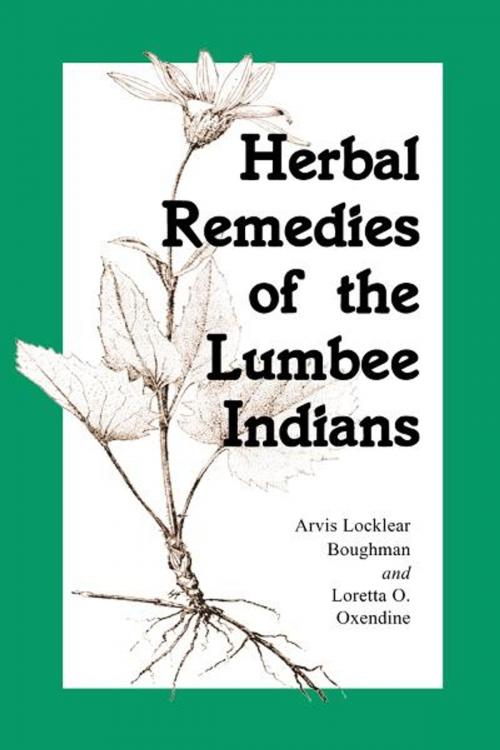Herbal Remedies of the Lumbee Indians
Nonfiction, Social & Cultural Studies, Social Science, Cultural Studies, Native American Studies, History| Author: | Arvis Locklear Boughman, Loretta O. Oxendine | ISBN: | 9780786426843 |
| Publisher: | McFarland & Company, Inc., Publishers | Publication: | December 31, 2003 |
| Imprint: | Language: | English |
| Author: | Arvis Locklear Boughman, Loretta O. Oxendine |
| ISBN: | 9780786426843 |
| Publisher: | McFarland & Company, Inc., Publishers |
| Publication: | December 31, 2003 |
| Imprint: | |
| Language: | English |
“There’s nothing happens to a person that can’t be cured if you get what it takes to do it. We come out of the earth, and there’s something in the earth to cure everything … I don’t fix a tonic until I’m sure what’s wrong with a person. I don’t make guesses. I have to be sure, because medicine can do bad as well as good, and I don’t want to hurt anybody.… Maybe it takes some herbs. Maybe it takes some touching. But most of all, it takes faith”—Vernon Cooper, Lumbee healer. The Lumbee Indian tribe has lived in the coastal plain of North Carolina for centuries, and most Lumbee continue to live in rural areas of Robeson County with access to a number of healing plants and herbs used in the form of teas, poultices, and salves to treat common ailments. The first section of this book describes and documents the numerous plant and herbal remedies that the Lumbee have used for centuries and continue to use today. There are remedies for ailments relating to cancer (external and internal), the circulatory and digestive systems, the heart, hypertension and hypotension, infections and parasitic diseases, asthma, pregnancy, sprains, swellings, and muscle, skeletal and joint disorders, to name just a few. The second portion of this work records the words, recollections and wellness philosophies of living Lumbee elders, healers, and community leaders. The information presented in this book is not intended to be a substitute for the advice or treatment from a physician. The authors do not advocate self-diagnosis or self-medication, and warn that any plant substance may cause an allergic or extremely unhealthy reaction in some people.
“There’s nothing happens to a person that can’t be cured if you get what it takes to do it. We come out of the earth, and there’s something in the earth to cure everything … I don’t fix a tonic until I’m sure what’s wrong with a person. I don’t make guesses. I have to be sure, because medicine can do bad as well as good, and I don’t want to hurt anybody.… Maybe it takes some herbs. Maybe it takes some touching. But most of all, it takes faith”—Vernon Cooper, Lumbee healer. The Lumbee Indian tribe has lived in the coastal plain of North Carolina for centuries, and most Lumbee continue to live in rural areas of Robeson County with access to a number of healing plants and herbs used in the form of teas, poultices, and salves to treat common ailments. The first section of this book describes and documents the numerous plant and herbal remedies that the Lumbee have used for centuries and continue to use today. There are remedies for ailments relating to cancer (external and internal), the circulatory and digestive systems, the heart, hypertension and hypotension, infections and parasitic diseases, asthma, pregnancy, sprains, swellings, and muscle, skeletal and joint disorders, to name just a few. The second portion of this work records the words, recollections and wellness philosophies of living Lumbee elders, healers, and community leaders. The information presented in this book is not intended to be a substitute for the advice or treatment from a physician. The authors do not advocate self-diagnosis or self-medication, and warn that any plant substance may cause an allergic or extremely unhealthy reaction in some people.















